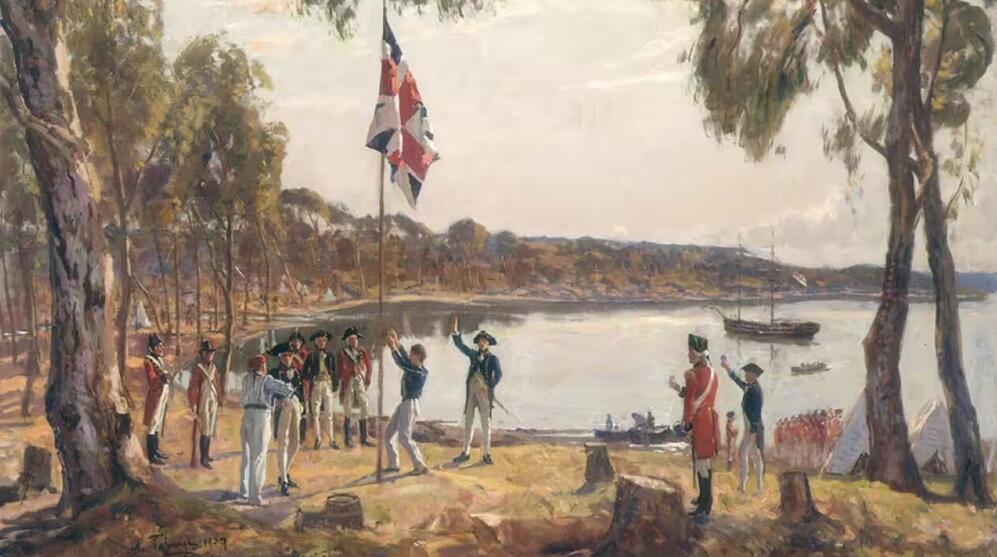Australia’s national day hasn’t always been held on 26 January. Here’s a brief history of it and the growing campaign to change the date.
Since 1994, Australia Day has been marked on 26 January with a national public holiday.
Some Australians have traditionally enjoyed a day off, with some choosing to host barbecues to enjoy the summer weather, while thousands of migrants also become Australian citizens at ceremonies held across the country.
But for many Aboriginal and Torres Strait Islander people – and an increasing number of non-Indigenous people who stand in support of them – 26 January is a day of mourning and is referred to as Invasion Day or Survival Day.
As controversy around the date continues, some businesses, educational institutions and government organisations are
allowing their staff to take a different day off instead
.
Celebrations atop Mount Kosciuszko in NSW for Australia Day. Credit: AAP
In recent years, the National Australia Day Committee has also broadened the focus of the day to be more inclusive of Indigenous people and new migrants, calling on Australians to “gather with friends, family and their community to reflect, respect and celebrate”.
Historian Kate Darian-Smith from the University of Tasmania said if the date of Australia Day was to change, it would be an acknowledgement that people don’t recognise 26 January as a meaningful date for contemporary Australia.
“There’s been quite a lot of work in recent years to show that Australia Day is quite inclusive of recent migrants, of people from all parts of the world – we’re all Australian, we’re all together, we’re all part of our country,” she said.
“How do you scoop up and make an inclusive celebration in what is a day, that if we take it back historically, is commemorating that moment of British landing and invasion?”
Why is it marked on 26 January?
Some believe 26 January commemorates the landing of the First Fleet, when convicts from England first set foot in Australia in 1788.
But the ships actually arrived at Sydney’s Botany Bay around a week earlier, sometime between 18-20 January. They decided to shift further north after finding the bay unsuitable.
The 26th was actually the day the fleet set ashore in Sydney Cove, a small bay in Sydney Harbour.
It marks the raising of the Union Jack flag in Sydney Cove by Captain Arthur Phillip, who also officially declared British sovereignty over half of Australia.
A painting depicting the arrival of the First Fleet and the raising of the Union Jack in Sydney Cove. Credit: State Library of Victoria
Professor Darian-Smith said Australia Day commemorates the first night on shore in Sydney Cove and the formal establishment of the colony of NSW.
She said 26 January was later referred to as ‘First Landing Day’ or ‘Foundation Day’.
“By the early 1800s dinners were being held to mark the foundation of the new colony of NSW,” she told SBS News.
As the settlement spread, other states marked their own foundation days.
“For example, in Western Australia, Foundation Day was held on 1 June, to celebrate the arrival of white settlers in 1829 [and] South Australia had a proclamation date,” Professor Darian-Smith said.
For a long time 26 January was seen as a very NSW-centric holiday but Professor Darian-Smith said the concept of a national day became more prominent in the late 19th century. In 1888, there were celebrations in Sydney for Anniversary Day on 26 January to mark the centenary of the First Fleet’s arrival.
A bigger push for a national day emerged after the federation of Australia in 1901, with a group called the Australian Natives Association arguing for Australia Day to bring together the new nation.
Professor Darian-Smith said that by 1935 all the states had adopted a common date and name for Australia Day on 26 January, but not all states had a public holiday on that date.
After the bicentenary in 1988 there was more discussion about a nationwide celebration, but 26 January wasn’t declared an official national public holiday until 1994.
Why do some see it as a ‘Day of Mourning’?
The arrival of the First Fleet is not seen as a day to celebrate by many due to the massacres and treatment Indigenous people experienced at the hands of the British settlers.
Professor Darian-Smith said opposition to celebrating 26 January was not new, and Aboriginal activists declared it a Day of Mourning as early as 1938.
Tens of thousands of Indigenous and non-Indigenous Australians also marched in protest against the day in 1988, Australia’s bicentennial year.
“The 26th of January will always be a day of mourning and a day of lament for my people,” Aboriginal pastor Ray Minniecon told SBS News before Australia Day in 2018.
“It was a deliberate invasion of our people. It also meant the massacres and genocides of our peoples right across this country.”
People at the Day of Mourning protest, 1938. Source: SBS News / Australian Institute of Aboriginal and Torres Strait Islander Studies (AIATSIS)
Who else wants to change the date?
Over the years non-Indigenous Australians have acknowledged the issues around celebrating 26 January.
Many businesses including Woolworths, Telstra, Network Ten, Deloitte, KPMG, EY, PwC, Woodside Energy, and even the University of Wollongong have announced
they will allow their employees to take a different day off
In 2017, the ABC’s national youth radio station Triple J announced it would change its popular Hottest 100 countdown to a different day after 60 per cent of listeners surveyed said it should out of respect for Indigenous Australians.
Fremantle Council voted in late 2016 to move its traditional Australia Day celebrations out of respect for Indigenous people.
Dozens of other councils cancelled their citizenship ceremonies
including Yarra and Darebin in Melbourne.
Victoria
cancelled this year’s Australia Day parade
.
Protesters crossing the Victoria Bridge during an Invasion Day rally in Brisbane. Source: SBS News / SBS News
The moves prompted the Morrison Government in 2019 to
force local councils into holding citizenship ceremonies on 26 January
or be stripped of their rights to hold them at all.
But the Albanese Government walked back the restrictions when it took government in 2022,
allowing councils to hold ceremonies three days before or after 26 January
, describing it as a “pragmatic” decision to make processing more efficient.
Prime Minister Anthony Albanese also overturned a ban stopping Commonwealth public service workers from swapping Australia Day for another day off, saying it was fine to have some flexibility in the system.
Who wants to keep Australia Day as it is?
Opposition Leader Peter Dutton has expressed support for Australia Day, in line with former Liberal leader Scott Morrison.
“We should be celebrating our flag, we should be celebrating Australia Day and all that’s great about our country and the people who want to rewrite history or ignore certain parts of history, that’s not the majority view in our country and good Australians should stand up and say so,” Mr Dutton told Flow News 24 on 20 January.
Mr Albanese has brushed off claims his government will seek to move Australia Day.
“I support Australia Day, the government supports Australia Day, there are no changes here,” he said.
Prime Minister Anthony Albanese says he supports Australia Day. Source: AAP / Lukas Coch
Will the date change?
Professor Darian-Smith said there had been increasing debate and discussion about Australia Day and she believes there has been quite a shift in attitudes, particularly with the number of companies allowing their workers to take a different day off.
“The day has become more and more problematic for larger numbers of Australians,” she said.
Professor Darian-Smith said the fact that some organisations were now allowing staff to take a different day off meant there was already an erosion in what may have originally been envisioned for Australia Day – as a day when everyone was off work on a public holiday.
Beachgoers celebrate Australia Day at Sydney’s Bondi Beach.
“I think it’s really a sign of maturity in a nation, when it can really debate and discuss these issues,” she said.
“[But] I don’t think it is an easy resolution.”
Professor Darian-Smith said most countries had a national day that reflected moments of national pride and national recognition such as Independence Day in the United States, but the pride in Australia Day was no longer there in the same way.
“Certainly not in the way that it would be for example, with the French around Bastille Day,” she said.
She said some would argue ANZAC Day is a more important day because it recognises the sacrifice of the nation, although this may also be fading in significance.
I think it’s really a sign of maturity in a nation, when it can really debate and discuss these issues
Professor Kate Darian-Smith
A 2018 poll by The Australia Institute found 56 per cent of respondents didn’t mind which day Australia Day was held on, so long as there was a national day of commemoration, while 49 per cent said it shouldn’t be on a day that offended Indigenous people.
But another poll released by the Institute of Public Affairs,
found 62 per cent of people surveyed this year wanted to celebrate on 26 January
, although this number has declined in the past few years.








Leave a Reply